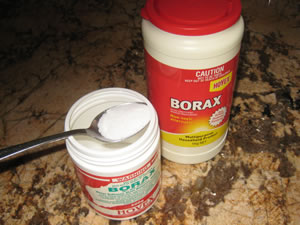Borax (sodium tetraborate hexahydrate or sodium borate) is a naturally-occurring mineral composed of sodium, boron, oxygen and
water. It has been used as a remedy for over 4000 years. Most commercially-produced borax is mined from deposits produced by the repeated evaporation of seasonal lakes. It is found in large quantities in the Western United States, in Mediterranean countries, Kazakhstan, and the Tibet region of China. Turkey is one of the largest commercial producers of borates.

Soil. It is the organic matter in a healthy soil that holds the boron. If there is insufficient organic content in a soil, any boron will quickly leach away. Adding soluble nitrogen fertilisers to soils causes them to lose their carbon (organic) content. This means that conventional chemical farming does enormous damage to soil structure by removing the organic carbon content. Most of the minerals in the soil are gradually depleted, but the most severe effect is on the boron content of the soil which rapidly depletes. Unfortunately it is not possible to spray boron compounds back onto the soil, because they are deadly to ants and some other insects. The best way to restore boron in soil is to add it to compost, and then add the fermented compost back to the soil. This means that most non-organic farms around the world today are severely deficient in boron.
Most people only get between 1.7 and 7 mg of boron per day, mainly from fruits, nuts, legumes and vegetables. This level represents a severe deficiency, with the deficiency being worse for people living in those areas where there is little or no boron in the soil. All conventionally-grown fruit and vegetables are low in boron. An apple grown in a chemically fertilised orchard may contain less than 1 mg of boron. In contrast, an organic apple grown in boron-rich soils may have 20 mg of boron. The traditional French diet provides about 36 mg of boron per day, and most other traditional diets using organic (no chemical fertiliser) fruits and vegetables would deliver a similar amount of boron.
Boron tends to concentrate in the bone, tooth enamel, nails, spleen and parathyroid gland. It is quickly and easily excreted, primarily through the urine. This means a regular dietary source of boron is required, as few reserves are held in the body to cover periods of deficient boron intake.
Borax contains about 11% boron by weight.
Borax's healing and preventative properties
Borax is a potent and effective remedy that deserves to be widely used, and should be in every home. It is so cheap and effective
that pharmaceutical companies have done their utmost to discredit it. They have managed to get it completely banned in Europe. In America and Australia it is banned for therapeutic use, but is still available in the laundry section of supermarkets. However in countries such as China, Japan, Turkey and Russia, where the big Western pharmaceutical companies do not have the same power to lobby (bribe, threaten and lie to) lawmakers and regulatory agencies, it is widely acknowledged and used.
See What the law allows pharmaceutical companies to do.
A limited amount of boron is absolutely essential for good health. Here are some of its properties (at different concentrations):
- Protect's you from Fluorides. Borax protects against the accumulation of fluorides in the body; is effective as an antidote in fluoride toxicity; and can remove fluorides from the body. (1, 2, 3, 4, 5, 20)
- Anti-microbial. Borax is toxic to some insects such as ants, cockroaches and mites. It also prevents parasites, protozoa and bacteria. (23)
- Fungicide. Effective against moulds and fungi, internally and externally. (17, 18)
- Anti-viral.
- Hormone normaliser. Stimulates the production of hormones, stabilises estrogen, assists with insulin use and blood glucose control, triglyceride use and production of reactive oxygen. With boron sufficiency, blood serum triglyceride levels are significantly lower. (12) Estrogen replacement therapy may not be necessary. (13, 16)
- Immune system enhancer. (12) Promotes healing of wounds. (14)
- Blood and fluid thinner. Boron helps fluids flow more freely in vessels, capillaries and gaps in joints. Blood flows more freely through fine capillaries, muscles and bones. See also natural blood thinners.
- Reduction and control of inflammation. (14, 16)
- Aphrodisiac for men and women. See low libido. Boron stimulates the production of DHT and testosterone (14, 16) and normalises oestrogen.
- Toxin removal. Chelator / protection from heavy metals. (8)
- Stabiliser of calcium, silicon, copper and magnesium levels, inhibits calcification. (12). Boron sufficiency normalises calcium levels, preventing both abnormal calcium deposition and bone weakness. (12, 13, 14) Boron sufficiency inhibits the accumulation of inorganic copper in the bones (12) and prevents loss of bone. (13) Boron assists with the assimilation of various minerals, particularly calcium and silicon. Those with insufficient boron in their diets may suffer a variety of bone, skin and connective tissue ailments. Insufficient body silicon is associated with rapid aging.
- Mental enhancement. Improves attention, both short and long term memory, perception, hand-eye coordination, and manual dexterity. (12, 14)...
No comments:
Post a Comment